John Hurrell – 26 October, 2012
In fact the twelve minute movie consists of a handful of zircon crystal dirt chucked into the air and shot in slow motion, a hundred times faster than the standard rate of 24 frames a second, the speed at which it is shown. Filmed against a black, light-absorbent backdrop, these plummeting particles, each one unique as they twist and turn, are dramatically illuminated on one side as they slowly descend at different speeds, a few even ascending upwards or moving across the screen.
A hypnotic film and five symbolically complex photographs - all featuring grit from crushed zircon crystal, a mineral 4,404 million years old (some of the oldest rock on the planet) - makes up the last Hopkinson Cundy show in Cross St before the gallery moves to Putiki St.
Australian artist Nicholas Mangan opened those premises with his Nauru Island exhibition. So it is fitting he should close them. A special light-proof enclosure has been built from chipboard for this: one end-wall becoming a large screen.
Inside, it takes a while for your eyes to adjust, and when they finally do you feel like you are witnessing parts of Kubrick’s 2001: A Space Odyssey, but even more intricate, and featuring scientific ‘reality’ - not models. We see thousands of what appear to be asteroids or meteorites spinning and traversing outer space, and swirling veils of cosmic dust.
In fact the twelve minute movie consists of a handful of zircon crystal dirt chucked into the air and shot in slow motion, a hundred times faster than the standard rate of 24 frames a second, the speed at which it is shown. Filmed against a black, light-absorbent backdrop, these plummeting particles, each one unique as they twist and turn, are dramatically illuminated on one side as they slowly descend at different speeds, a few even ascending upwards or moving across the screen.
Often the density of motes changes, from granular chunks close by to very fine veils of dust (like The Milky Way) in the distance. (Dust here of course is in the mineral ‘dirt’ sense, not made from strands of fabric or flakes of worn skin as in the domestic meaning.) There are even areas of cascading ‘waterfalls’ of grit (it’s like coarsely ground coffee), or showers of slow moving ‘stars’. All of which makes this movie of broken down sections of the earth’s crust extremely engrossing.
So here’s the conceptual juxtaposition: specks of dirt 4,404 million years old (only 150 million after the planet was formed), seen so they are almost frozen or suspended - with each image shot at 2,400 frames a second. A dramatic contrast.
The photographs not connected to the film as stills, develop its ideas in the two accompanying pieces of writing. They pertain to geology and scales of time. Tools for collecting samples, measuring and assisting analysis dominate, as well as manuals containing anthologies and histories of geological research - all posed with crushed aggregate or sections of rock strata. These images of equipment are constructed with a restrained wit to look like miniature landforms in their own right (eg. the book as cliff), or vaguely aerial views of landscape, such as schematic maps (like hammer as escarpment).
One other work in the office has no photographic component at all but is a sculpture in a frame, held in by deliberately dusty, half-wiped glass. The bottom lip holds a low mound of reddish dirt that from a distance could almost be a horizontal drawing of a gently sloping hill, alluding to the location of its source, Jack Hills. Clever, classy stuff.
This is one of the top shows Hopkinson Cundy have had in this space - maybe the best - and a wonderful note to shift out on. The film is glorious.
John Hurrell
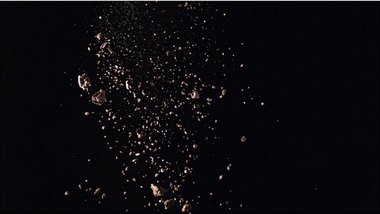
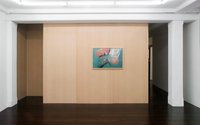
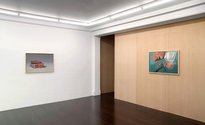
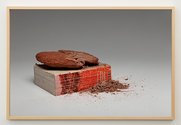
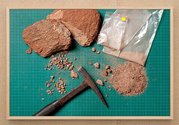
 Advertising in this column
Advertising in this column Two Rooms presents a program of residencies and projects
Two Rooms presents a program of residencies and projects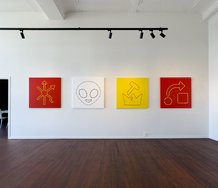
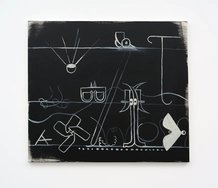
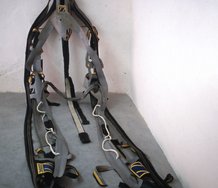
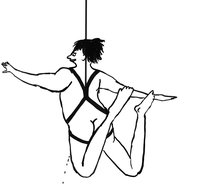
This Discussion has 0 comments.
Comment
Participate
Register to Participate.
Sign in
Sign in to an existing account.